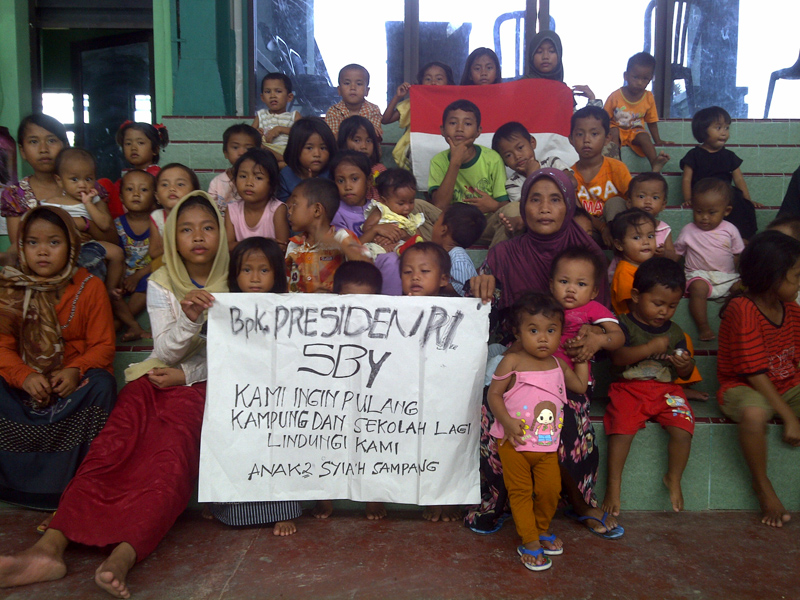AMNESTY INTERNATIONAL
PUBLIC STATEMENT
The Indonesian government must take immediate steps to ensure the safe, voluntary and dignified return of a Shi’a community from Sampang, Madura Island, back to their homes. The continued displacement of the community – one year after a deadly attack against them – calls in to question government commitments to resolve their situation, and highlights a wider pattern of government failures to address religious intolerance and abuses against minority groups in the country.
The Shi’a community from Sampang, Madura Island were forcibly evicted and displaced on 26 August 2012 after an anti-Shi’a mob attacked their village. Since then, the community have lived in two different temporary shelters, where they have not had adequate access to health services, adequate housing, water and sanitation. Many of the children have had to stop schooling and are still traumatized by the attacks. The forced eviction and continued displacement has also had a negative impact on community livelihoods – and their ability to work and support themselves – as most of the adults are tobacco farmers who can no longer farm their land.
In July and August, President Susilo Bambang Yudhoyono met with members of the Shi’a community and promised to return them to their village and to rebuild homes and buildings that were destroyed. A reconciliation team was formed after the meeting in July. However, the community are still waiting for tangible results and remain in limbo, uncertain of their future.
The authorities are still failing to provide the affected community with complete information and to engage in genuine consultation with them on the feasible option for return. As a State Party, Indonesia has an obligation under Article 11 of the International Covenant on Economic, Social and Cultural Rights (ICESCR) to protect and fulfil the right to adequate housing for all its people, including preventing forced evictions by third parties and providing victims with an effective remedy.
Amnesty International calls on the authorities to ensure the safe, voluntary and dignified return of the evicted community back to their homes, together with effective remedies for the human rights violations perpetrated against them, including compensation for the harm suffered and damage and destruction of their homes, rehabilitation, restitution and guarantees of non-repetition. Amnesty International also urges the Sampang police to investigate thoroughly all of the alleged crimes against people and property that took place on 26 August 2012 and to prosecute those who were responsible. Five people were sentenced to between eight months and four years’ imprisonment for committing violence (Article 170), “maltreatment” (Article 351) and manslaughter (Article 338). A sixth person who was believed to be behind the attack was acquitted.
Amnesty International is also concerned about allegations that some members of the Shi’a community who are still in the village have been forced by the Sampang authorities and police to “repent” and convert to Sunni Islam as a condition to stay in their village. The authorities and police threatened that if they did not convert, their homes would be burnt and their safety could not be guaranteed.
The case highlights a wider problem of religious intolerance and abuses against religious minority groups in the country. In a similar case, an Ahmadiyya community in Lombok have spent more than seven years in a temporary shelter after they were displaced by a violent attack in February 2006. Amnesty International continues to receive reports of harassment, intimidation and attacks against religious minority groups in Indonesia. Those who commit acts of violence against religious minorities are rarely punished.
The right to freedom of religion is guaranteed in the Indonesian Constitution. Article 18 of the International Covenant on Civil and Political Rights (ICCPR), to which Indonesia is a state party, states that “this right shall include freedom to have or to adopt a religion or belief of his choice” and that “no one shall be subject to coercion which would impair his freedom to have or to adopt a religion or belief of his choice”.
The authorities must ensure that all religious minorities are protected and allowed to practice their faith free from fear, intimidation and attack. They must investigate all reports of government officials being directly involved in forcing the Shi’as and other minorities to renounce their faith.
During a speech to mark Indonesian Independence Day on 17 August, President Yudhoyono observed that Indonesia had longed embraced religious, social, cultural and other differences and called on Indonesians to maintain religious tolerance. He also emphasized that it was “unacceptable that a person or certain group of people impose their beliefs on others, let alone using threats, intimidation, and violent actions”. Resolving the situation of the Shi’a community in Sampang would be a positive step in that direction.
Josef Roy Benedict
Campaigner – Indonesia & Timor-Leste
Amnesty International Secretariat
1 Easton Street
London WC1X 0DW, UK
Email: jbenedic@amnesty.org








